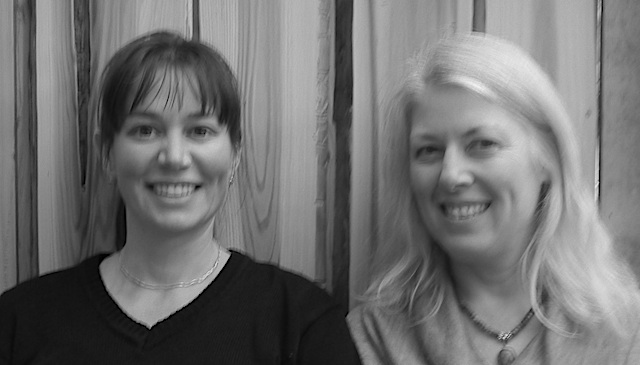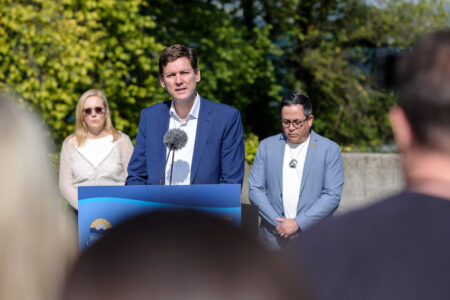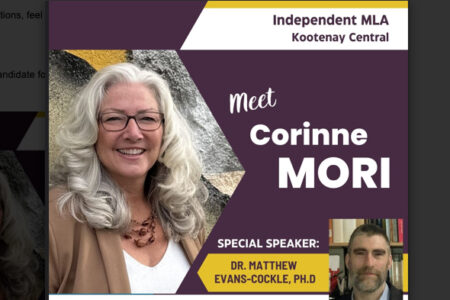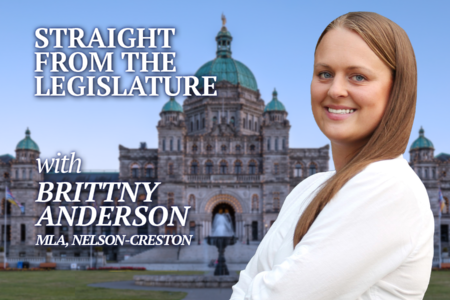Looking for a Cultural Shift: An Interview with Councillors Batycki and Kiss, Part 2
Paula Kiss and Candace Batycki are the newest and youngest Nelson City Councillors. They were elected for the first time just over a year ago. Recently they talked with The Nelson Daily about their first year. In part 1 of the interview, which appeared in The Nelson Daily on December 11, they talked about:
- what the most like about the job
- in what ways it is different from what they expected
- what they have learned
- what initiatives they would like to bring to the table in their remaining two years.
Here is the remainder of the discussion.
The Nelson Daily: Are there people in town who are not represented by council, and how do you approach that?
Paula Kiss I think that council tends to attract a certain type of person from a certain phase of their life, someone who tends to be retired. So they forget about the struggles you are going through when you are trying to buy that house or start that family, or choosing not to do that because you can’t afford to. I think things like that get lost by the time you are collecting your pension and your house is paid for.
(People in the retirement stage of life) forget what other people are going through because many of those (younger people) are not participating because they don’t have time.
It is important for me to represent people that don’t have cars, because the attitude on council between the management staff and council seems to be that everyone owns a car. But you know what, they don’t. You can talk about parking as being the only issue downtown. But you also have to talk about what is it like for people that are not like you, and that is my favourite part about being on council is providing a voice to people that normally don’t have voices because they are not only underrepresented, they are just plain not represented.
Not married, don’t have kids, have no family here, live on less than 35,000 a year, not be in a family where your real estate is passed down to you, be a renter, those concepts are not there.
Let’s say you have some mental health issues or you are not well placed or not well connected– you are not represented. And it excites me that I can take a stab at that.
What Council decision has been most challenging for you so far?
Candace Batycki: Permissive tax exemptions was gruelling. We had a lot of meetings, we talked about that a lot, and then almost made a decision and then ended up amending it, the part about the churches…
And Stop the Violence (the marijuana legalization discussion) was challenging. Thinking on your feet is something I am getting better at and I don’t think I thought on my feet very well on that one.
Paula Kiss: The problem I had with the whole Stop the Violence discussion was I felt like the democratic process had failed, and so the votes we were making, and the conversation we were having, were not following the protocol that was supposed to be followed for us to debate something in the democratic process. That challenged me, not in the decision I was trying to support, but because what I was trying to support was not recognized because the democratic process was failing.
What do you think the public needs to know about city hall?
Paula Kiss: That their involvement in the community makes a really big difference, and if you are passionate about an issue you can affect change in a town this size. If you were to inform the right people and make your opinion known in a clear way you can impact and influence how this town works in the future. That is one of the reasons I moved here. I was looking for a town of less than 10,000 because I wanted to be in a community that was responsible to its citizens. That is the magic number where everyone can be heard.
Candace Batycki: We have seen examples of people who had good ideas and brought them forward and because they were good ideas, and because they had done the organizing work to line up their allies to support them, things happened.
The mural project, the SEED project at the greenhouse, the transit group, the Rosemont bike park– where people get it together and come to us, and if it is a good idea and is supported by a bunch of people in the community, it is hard for Council to say no to.
So, organize. That’s my answer to everything.
Paula Kiss: When we were first oriented we were told that our role was to be in governance and policy making, and not to get into everyday operations. I am often approached by citizens who are looking for me to meddle with operations, which is something I want to steer clear of. Like if there is a pothole at the end of someone’s driveway I do not want to be contacting staff about that.
I want citizens to know that we have staff who will deal with those operational issues. But if they have an issue regarding policy or performance or governance, that is when I need to be informed. But not necessarily if the street needs ploughing or the streetlight needs replacing, because we have staff for that.
Candace Batycki: I like to think it is pretty transparent. We have these Committee of the Whole meetings and people are welcome to come to them and welcome to come the budget meetings. I don think there are any big secrets, but I think we do not make it easy for people to find things out.
We tend to the informing end of things, rather than creating situations where it is actually participatory decision making on some level.
We don’t do a lot of participatory decision-making. I think we do something and then we ask for feedback and then we incorporate that feedback if we want to.
That hampers the general knowledge of the population, the level of involvement, the level of trust and creativity.
I would like them to know that when we are budgeting we are budgeting for 25 years, which I think is really cool and the city is in good long-term shape because of that.
Paula Kiss: And another thing is what people think is the city’s responsibility, but what our actual roles really are. For example, people say downtown businesses are struggling, and the city should do something about that. Well what exactly can the city do? There is a very limited things the city can do.
We are responsible for providing safe liveable communities with adequate infrastructure. We are going beyond what municipalities’ original mandates were, even to start getting into things like arts and culture. Other than creating an environment where arts and culture can thrive, for us to be trying to manage it is really a stretch, and that is new territory for municipalities.
You both came into this job with environmental experience and credentials. How are you feeling about that after a year on council?
Candace Batycki: I feel good, I think about the transfer station park, which I am involved in now, and the Kootenay Lake Partnership, which is four levels of government developing a lake management plan for Kootenay Lake. Ecosave– I am curious to see the numbers on the effectiveness, but in terms of participation it has been great.
Can we do more? Yeah, we can. I see the reports coming out of the UN and I despair that we are still driving our V8 trucks downtown. I don’t want to sound judgmental or point fingers, because we all act incongruently. So should the city move more quickly? I would like it, but on the other hand I couldn’t keep up. So that is a round- about way of saying at the municipal level, yeah, in the big picture no.
Paula Kiss I am somewhat unsatisfied at what a slow process change is. Because what I am looking at is a cultural shift, and I realize that is not going to happen in the space of a term or a year or ten years.
Certain things are very frustrating, like why can’t we councillors carpool to council meetings, or take the bus, or whatever.
When there is an event that ten city staff members are going to, why don’t we go together, why are we not just more cooperative? That is what I wish for, in order for this cultural shift to take place.
We could move it along a lot faster if our leaders led by example. I remember sitting at a meeting and (City Manager) Kevin Cormack said he took the bus to work today. And I thought, that’s great, I wish we could all do that now and then. To have our city manager say he took the bus to work is a sign of a cultural shift. I am impatient. I want it now.
Has being on council affected your social life?
Candace Batycki: Socially I go out more than I would normally, but one of the things people don’t know about politicians is that some of them are introverts, and I am, and I don’t go out at night unless I to go a council function. Really, I am not a night person so I feel like there are a lot more evening events I should be going to. I am not as visible as I should be, but I just can’t change my personality.
So, gentle reader, you will have to stop me on the street because you are never going to see me in the bar.
Paula Kiss: I was foolish to think I could be on council and do all this while still retaining my anonymity, but that is not the case. Everyone seems to know who we are and will ask how its going, and that has its drawbacks.
But a lot of people are quite thankful and I feel like I get quite a bit of respect and appreciation from community members, especially people my own age.
I am of the age where most people do not have time to participate because they have purchased houses and they are working two jobs and they have kids and they are newly married, and good luck participating in the community. So a lot of them say thanks for doing this because I don’t have time. I like hearing about that, but I don’t like losing my anonymity.

























